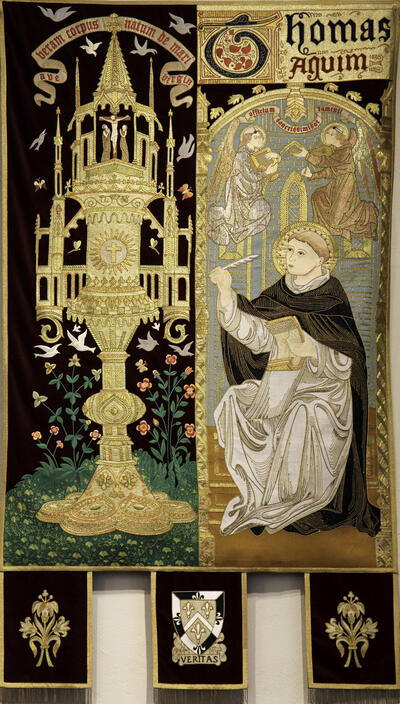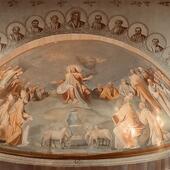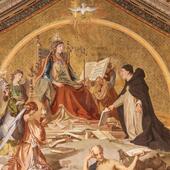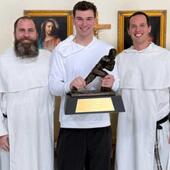Oh precious and wonderful banquet!
Today we celebrate the Solemnity of Corpus Christi, commemorating the real presence of Jesus in the Eucharist. In the miracle of the Eucharist, we get to look at God. He feeds us with his very self. And we do not die; we live, abiding in Him.
We can contrast this with the perspective of today’s first reading from Exodus for the Liturgy of the Hours (different from the lectionary readings for Mass). After God and Israel ratify the covenant and the Israelites tell Moses, “all that the Lord has said we will heed and do,” Moses sprinkled the blood of the sacrifice for the covenant on them. Then, the elders of Israel accompany Moses up the mountain. Something they found unimaginable happened next.
They beheld the God of Israel. Under his feet there appeared to be sapphire tilework, as clear as the sky itself. Yet he did not smite these chosen Israelites. After gazing on God, they could still eat and drink (Exodus 24: 9-11).
The biblical writers-with a reverent deference noting total wonder and awe at God’s glory and majesty--are amazed that somehow these Israelites could behold the God of their ancestors, live, and continue their lives with a semblance of normalcy afterwards: “they can still eat and drink.” In contrast with a biblical tradition that people could not see the face of God and live (like Exodus 33:20 mentions), these Israelites have an encounter with the God who claimed them for his own and survived. God in these moments was not shrouded in the clouds from their sight; He did not move with them, hidden by a pillar of fire, and he did not speak to them in a still, small voice or through the message of angels. They saw the living God with their own eyes and were in awe that they lived to tell the tale.
As we celebrate Corpus Christi, maybe we can bring some of the wonder and awe that the elders of Israel experienced when encountering God to our experience of the Eucharist today. Then we can approach the Eucharist with both a renewed sense of our own humility and an appreciation for the humility of Jesus, who continues to make himself known to us in the breaking of the bread.
Trying to retrieve a sense of wonder at the mystery of God drawing close to us in the Eucharist, I remember my own First Communion and the mixture of awe, excitement, and gratitude I experienced. For weeks after, I tried to note each subsequent time I received the Eucharist. (I lost track somewhere around what I called “my 24th communion”). In the years and thousands of Masses since, while I have not forgotten that sense of wonder or humility, it is easy to take the gift of Jesus sharing his own life with me for granted.
The reflections of St. Thomas Aquinas can help us marvel at the gift of the Eucharist:
O precious and wonderful banquet, that brings us salvation and contains all sweetness! Could anything be of more intrinsic value?... What could be more wonderful than this? No other sacrament has greater healing power; through it sins are purged away, virtues are increased, and the soul is enriched with an abundance of every spiritual gift. It is offered in the Church for the living and the dead, so that what was instituted for the salvation of all may be for the benefit of all. Yet, in the end, no one can fully express the sweetness of this sacrament, in which spiritual delight is tasted at its very source, and in which we renew the memory of that surpassing love for us which Christ revealed in his passion.
St. Thomas helps us to marvel at the wonderful mystery of Christ giving himself to us in the Eucharist. And at the same time, we can ponder the fittingness of God’s humility in the Eucharist. He who made himself a totally dependent infant in the Incarnation and laid in a trough for animals as his first bed comes now to be our food and drink. He who made the world out of nothing, who turns sinners into saints, and brings life out of death and despair, now offers himself to us as true food and true drink under the appearance of bread and wine.
And instead of leaving us when returning to the Father, Jesus is still with us here with us in our own parishes, every day. He is present in parishes bombarded by constant shelling across the globe. He gives himself as food to be received by people we don’t like, and by people who we would rather not forgive or condone. He gives himself to us, however we come before him, whether we marvel at that gift or receive him without much thought.
As we behold the Lamb of God on this solemnity of Corpus Christi, we can marvel with the Church across the ages that Jesus, the living Bread, comes down from heaven. He not only lets us behold him with our eyes. He lets us hold him, and receive him.
Thank you, Jesus, for the gift of yourself. Help us to know and love you better and not forget the beauty and significance of this gift.
Hope Zelmer
Hope Zelmer is a writer and a former theology teacher and campus minister at Fenwick High School, a Dominican Catholic preparatory school in Oak Park, Illinois. Hope has written for publications such as FaithND, Church Life Journal, and FemCatholic. She holds a BA and MA in Theology from the University of Notre Dame.





